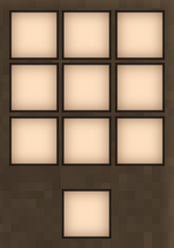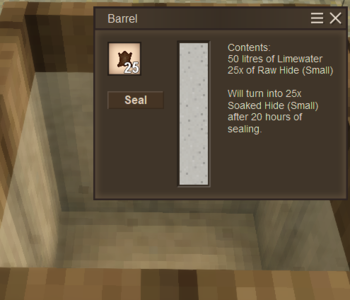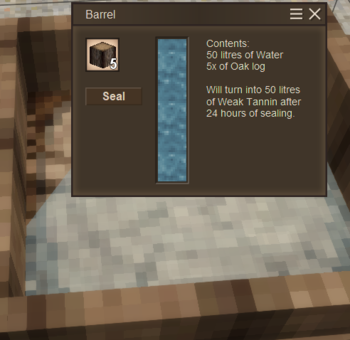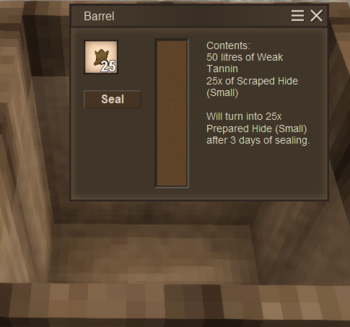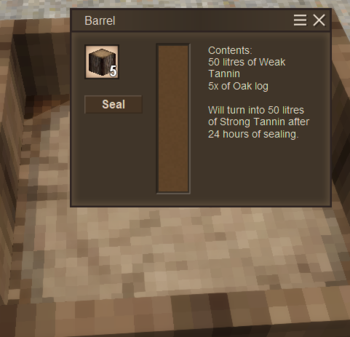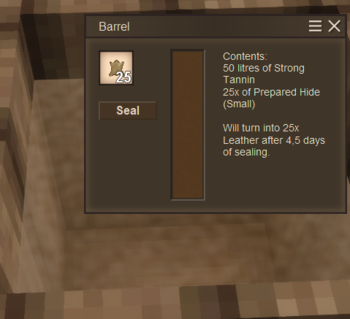Garbowanie skóry
Garbowanie skóry opiera się na specjalnych recepturach dostępnych dla beczek, które pozwalają graczowi zamienić surowe skóry w skórę.
Potrzebne materiały
Do stworzenia skóry potrzeba:
- Surowych skór.
- Beczek do przetwarzania surowych skór.
- Zapasu dębowych pni do tworzenia tanin.
- Drewnianego wiadra do przenoszenia płynów.
- Zapasu limonki lub sproszkowanego boraksu.
Hides
Hides can be looted from wild or domesticated animals upon death. The following animals have a chance to drop hides:
- Small Hides: Hare, Raccoon, Fox, Lamb
- Medium Hides: Wild Pig, Hyena, Wolf
- Large Hides: Sheep
- Huge Hides: Bear
Lime & Powdered Borax
Lime can be extracted from loose limestone, loose chalk stone, or sea shells. Limestone and chalk may be either crushed with a hammer in your inventory crafting grid, or ground in a quern. Both methods yield the same amount of lime per loose stone; however, using a hammer will consume some of the tool's durability, while a quern does not get damaged by repeated use. One loose stone yields one lime.
One shell yields two lime. Shells cannot be crushed with a hammer and must be ground in a quern.
Lime can also be used to make quicklime, which is necessary to produce plaster and mortar.
Powdered borax is an alternative to lime that can be extracted by grinding a chunk of borax ore in a quern. One borax chunk yields two powdered borax.
Powdered borax is also a necessary material in the process of smithing an iron or meteoric iron anvil.
Example Shopping List
To process 8 leather, which would be sufficient to craft 1 backpack, the player would need the following materials (rounded up in parentheses):
- Oak or Acacia Logs: 3 for small hides or 6 for medium, large or huge hides
- Lime or Powdered Borax - one lime or chalk stone can be ground into one lime; one borax can be ground into two powdered borax
- Lime: 8 for small, 17 (20) for medium, 19 (20) L for large and 20 L for huge
- Powdered borax: 4 for small or 8 for medium, large or huge
- Hides: either 8 small, 4 medium, 3 large or 2 huge
- Limewater or Diluted Borax: 8 (10) L for small, 17 (20) L for medium, 19 (20) L for large and 20 L for huge
- Weak Tannin: 16 (20) L for small, 34 (40) L for medium, 38 (40) L for large and 40 L for huge - of which half will be turned into:
- Strong tannin: 8 (10) L for small, 17 (20) L for medium, 19 (20) L for large and 20 L for huge
Hide Processing Sequence
Players may only process one size of hide at a time: small, medium, large, or huge. Also, each of the sizes use different amounts of solution. One huge, large, medium or small hide require 10, 6, 4, or 2 liters respectively.
The different sizes of hides also give different amounts of leather after finished processing. One huge, large, medium, and small hide produce 5, 3, 2, and 1 leather respectively.
The following chart shows the requirements to make one full barrel of each solution, as used farther down in the respective processing steps:
| Base Liquid | Solvent | Makes 1 Full Barrel of |
|---|---|---|
| 50 L Water | 50 Lime | Limewater |
| 50 L Water | 20 powdered borax | Diluted Borax |
| 50 L Water | 5 oak/acacia logs | Weak Tannin |
| 50 L Weak Tannin | 5 oak/acacia logs | Strong Tannin |
Step 1: Limewater or Diluted Borax
To make soaked hides, limewater or diluted borax may be used:
- Limewater: 1 liter of water and 1 lime makes 1 liter of limewater - which means a full barrel of limewater requires 50 lime.
- Diluted borax: 5 liters of water and 2 powdered borax make 5 liters of diluted borax - which means a full barrel of diluted borax requires 20 powdered borax.
To make either limewater or diluted borax, it is not required to seal the barrel or wait for a processing time. Simply add the required amount of lime or powdered borax to a barrel filled with the required amount of water; if the ratio is correct, the water will instantly change into limewater or diluted borax. If the player is unsure about the correct ratio, simply fill the barrel with the amount of water and keep adding lime or powdered borax one by one until the change happens.
Once the player has acquired the necessary lime or borax solution, the raw hides can be placed inside the barrel, after which it needs to be sealed for 20 in-game hours to turn into soaked hides. Similar to the above process, a specific ratio must be reached. The player can start with one hide and check the barrel tooltip; it should display the amount of liquid solution and input hides as well as the possible output. If there is no output shown, the player placed too many hides in the barrel for the available amount of liquid.
Step 2: Scraping Hides
Once the raw hides have been soaked long enough, they will turn into soaked hides. These cannot directly be further processed in barrels; another crafting step comes in between. The player needs to put the soaked hides and a knife into the inventory crafting grid to process them into scraped hides. Please note that the knife will lose durability in the process.
Step 3: Weak Tannin
To make weak tannin, the player needs 10 units of water per oak/acacia log. After inputting the oak log, the barrel tooltip will display the materials present as well as the predicted output. The barrel must be sealed for 24 in-game hours to actually produce weak tannin; it cannot be sealed if an unbalanced ratio of water and oak logs are present in the barrel.
After the player acquired weak tannin with the above procedure, place the scraped hides into the weak tannin solution. Again, further processing of the hides requires sealing in the barrel - after 4 in-game days they will become prepared hides. Similar to the previous processes, a specific ratio must be reached. The player can start with one hide and check the barrel tool tip; it should display the possible output. If there is no output shown, the player placed too many hides in the barrel for the available amount of liquid, and the player will not be able to seal it.
Step 4: Strong Tannin
To make strong tannin, the player needs 10 liters of weak tannin per oak/acacia log. After inputting the log, the barrel tooltip will display the materials present as well as the predicted output. The barrel must be sealed for 24 in-game hours to actually produce strong tannin; it cannot be sealed if an unbalanced ratio of water and oak logs are present in the barrel.
After the player acquired strong tannin with the above procedure, place the prepared hides into the strong tannin solution. Again, further processing of the hides requires sealing in the barrel; after another 4.5 in-game days they will become leather. Similar to the previous processes, a specific ratio must be reached. The player can start with one hide and check the barrel tooltip; it should display the possible output. If there is no output shown, the player placed too many hides in the barrel for the available amount of liquid, and the player will not be able to seal it.
After waiting for the sealed hides to process, the player will be rewarded with the respective amount of leather ready to be used in crafting.
Pelt
Different from Leather, making pelts is relatively easy.
Hide curing
To create pelts, only two steps need to be followed. First, raw hides need to be oiled. This can be done by combining raw hide and fat in the crafting grid using the following ratio: 4 small hide + 1 fat, 2 medium hide + 1 fat, 1 large hide + 1 fat or 1 huge hide + 2 fats.
In a second step, these oiled hides need to be "cured", which means nothing else but leaving them untouched for 48 hours. There is no process involved and the storage place doesn't matter - the player can carry them around in the inventory or leave them in a storage container. The tooltip on the item will inform how much the curing has progressed.
Once completely cured, the oiled hides will turn into pelts that can be used in different crafting recipes.
Usage
Medium or large pelts are required to craft the hunter's backpack, a cheaper variant of the leather backpack with only 4 slots, as well as the Lamellar armor recipes and fur clothing recipes. Small or medium pelts are required for the longbow recipe.
Video Tutorials
| Detailed explanation how to make leather |
|---|
| Wiki Navigation | |
|---|---|
| Vintage Story | Guides • Frequently Asked Questions • Soundtrack • Versions • Controls |
| Game systems | Crafting • Knapping • Clay forming • Smithing • Cooking • Temperature • Hunger • Mining • Temporal stability • Mechanical power • Trading • Farming • Animal husbandry |
| World | World generation • Biomes • Weather • Temporal storms |
| Items | Tools • Weapons • Armor • Clothing • Bags • Materials • Food |
| Blocks | Terrain • Plants • Decorative • Lighting • Functional • Ore |
| Entities | Hostile entities • Animals • NPCs • Players |
| Miscellaneous | List of client commands • List of server commands • Creative Starter Guide • Bot System • WorldEdit • Cinematic Camera • Adjustable FPS Video Recording • ServerBlockTicking |
